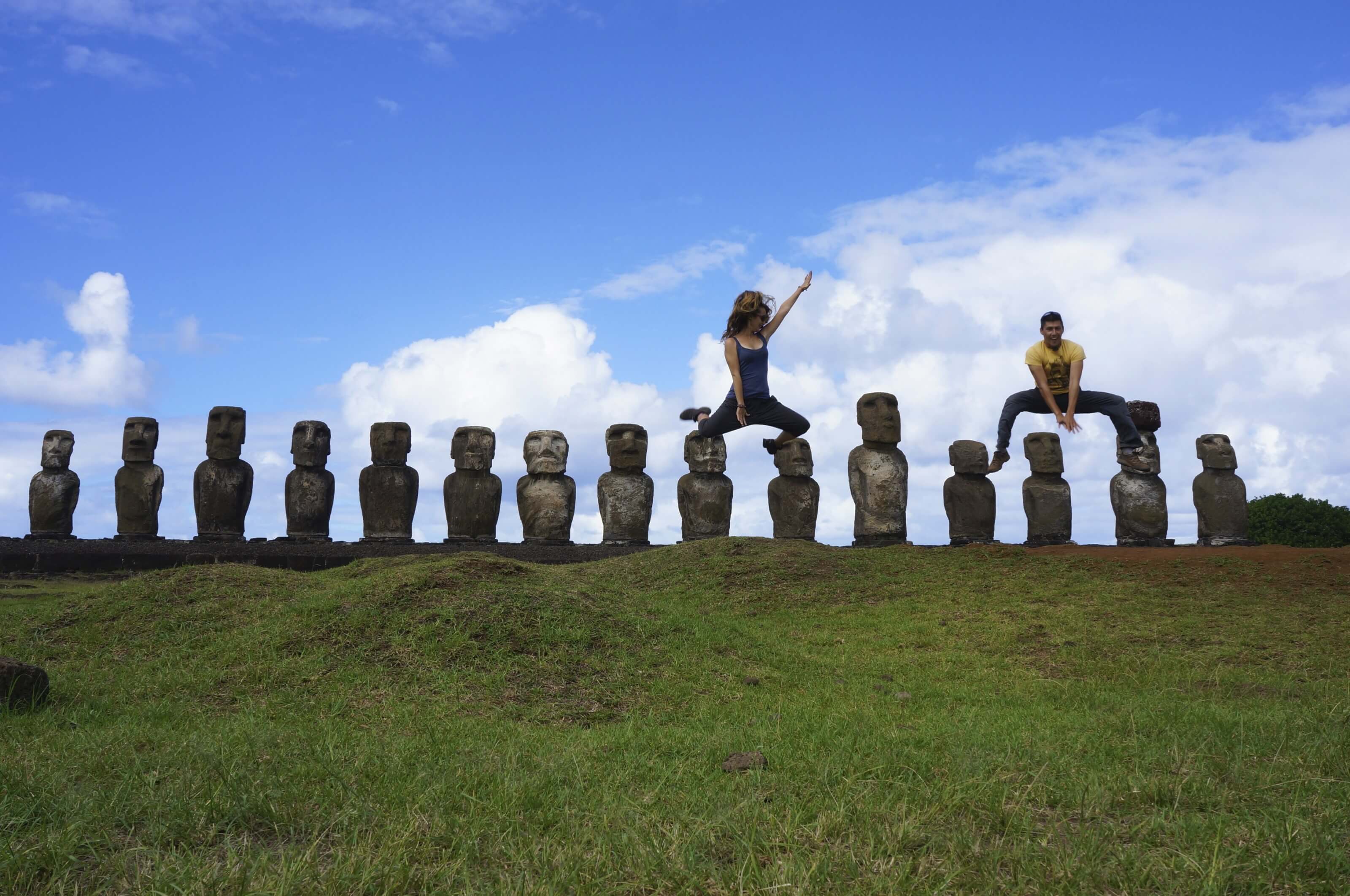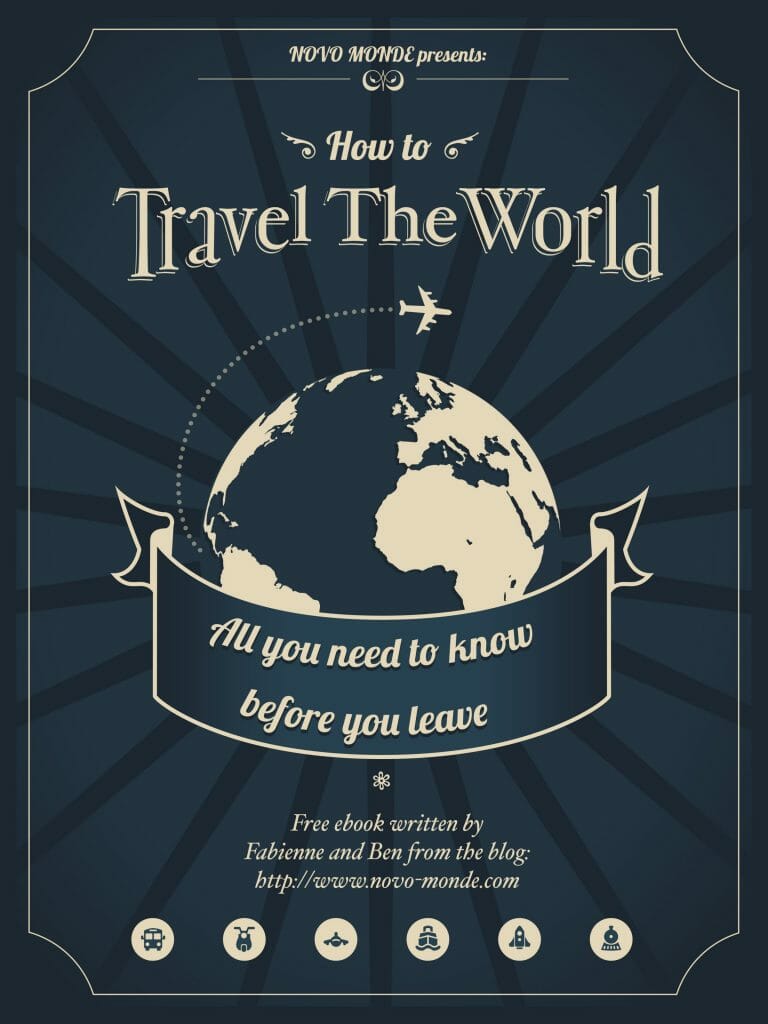Today, we’re tackling a topic that’s very sensitive for me: vaccines for backpacking around the world! Yes, I’m quite the wimp and particularly phobic when it comes to all sorts of injections… The preparations for our round-the-world trip at least forced me to do one thing: update my vaccinations. Well, Ben wasn’t to be outdone…
When we first visited our doctor, I brought my vaccination record. When the doctor opened it, she kindly smiled and simply said, “Well, I think we can throw this away, right? We’ll just make you a new one”. The tone was set right from the start! I admit that my last vaccine was in 1996… Since it wasn’t mandatory for school anymore, I’ve always made a point to avoid this topic with my general practitioner. As for Ben, it’s simple, his vaccinations were so old that he couldn’t even remember where he had stored that famous little health record booklet!
The discussion about vaccines for this trip was quite lengthy: firstly, because our general practitioner wasn’t quite up to speed on the concept of a trip around the world, and secondly, because we had to weigh the pros and cons of all these famous injections… In the end, we got vaccinated against practically everything! And I have to admit that it wasn’t as terrible as I thought. I realize that I’m really a bit of a wuss sometimes. To be honest, I didn’t even feel the injections (except for the rabies one, which stung a bit)!

Choosing vaccines for traveling around the world
The topic of vaccines is a bit delicate. We’re not going to preach for or against vaccination; everyone has the right to their opinion on the subject. For backpacking around the world, there are generally no mandatory vaccines if you’ve kept up with your boosters. It mainly depends on the destination and your medical history. On our part, we chose to get vaccinated before embarking on this long journey. In the following paragraphs, you’ll find, among other things, the list of vaccines we got, the geographical maps to know which countries are at risk, and the budget you’ll need. Here’s where it hurts, besides the needle: travel vaccines are a significant expense in the budget for a round-the-world trip!
Please note that this is solely our experience; nothing will ever replace a visit to your doctor. We recommend making an appointment with your general practitioner or a travel clinic as soon as you’ve planned your itinerary or at least 3-4 months before departure. Below, we present the average prices of vaccines, to which you’ll need to add the cost of the injection, which is administered by a nurse or a doctor.

In addition to vaccines, it’s also very important to inquire about travel insurance. If you haven’t made your choice yet, we suggest consulting our comparison. In this guide, we compared all the major players, with advantages and disadvantages for each. The compared insurances are:
Combined vaccine for diphtheria, tetanus, pertussis, and poliomyelitis (DTP)
Our first travel vaccine was a combination of booster shots for diphtheria, tetanus, pertussis, and poliomyelitis. Vaccine price: between 15 and 35 euros at the pharmacy. This vaccine is a single dose administered intramuscularly and protects for several years. It is generally the first vaccine recommended for travelers. Tetanus, whooping cough and diphtheria are still present throughout the world. Poliomyelitis was more or less eradicated in the 2000s, although there are still a few cases of contagion in Pakistan and Afghanistan.

Vaccine against meningococcal A, C, W135, and Y
Our second vaccine was the vaccine against meningococcal infections. This vaccine was more expensive (between 50 and 70 euros), but according to our doctor, it was worth it. At the time, the vaccine against meningococcal meningitis A, C, W135, and Y was strongly recommended for stays in Africa and some areas of South America. Today, only a large part of the African continent is affected by these infections. So if your trip around the world doesn’t include Africa, there’s no need to get vaccinated 😉 (and your wallet will thank you!).

Rabies vaccine
The rabies vaccine was our third vaccine for the backpacking trip. This one wasn’t fun in terms of injections because this vaccine requires three injections: on day 0, day 7, and day 21 (ouch!). But you’re set for life afterward… Please note that it doesn’t immunize against the disease! This vaccination is preventive; it buys time (7 days) to seek treatment in case of a bite. And since we wandered in quite remote areas, we were still glad we got it. The price of the vaccine in Austria is around 70 euros and 50-70 euros per injection in France.

Typhoid fever vaccine
Our fourth vaccine was against typhoid fever, strongly recommended for prolonged stays in Southeast Asia. Typhoid fever is an infection caused by a bacterium and is transmitted through ingestion of water or food contaminated by feces. Its price is around 35 euros, and you can combine it with hepatitis A (90-110 euros). This vaccine remains valid for 3 years.

Yellow fever vaccine
The yellow fever vaccine was our fifth vaccine. This viral disease is very serious and is transmitted through mosquito bites. This vaccine must be administered at an approved vaccination center because the general practitioner is not authorized to do so. You will then receive an international vaccination certificate stating that you’ve been vaccinated. It is strongly recommended for entry into certain countries in Latin America in particular. WHO has shared the list of countries where the yellow fever vaccine is mandatory for all travelers or those coming from risk countries. The yellow fever vaccine costs around 70 euros and is valid for life.

Hepatitis A and B vaccines
For the sixth travel vaccine, I name the hepatitis ones! Before getting these, we had a blood test to check our immune system. After this test, I cried with joy because I was immune to hepatitis A. So, I just needed a booster for hepatitis B. However, for Benoit, the result was clear: zero immunity! So, he had to get 1 to 2 injections of the combined hepatitis A + B vaccine. The price of the combination is around 70 euros and 45 euros for just hepatitis B.


Japanese encephalitis vaccine
And to finish, our seventh and last vaccine for backpacking around the world, the Japanese encephalitis vaccine, a disease caused by a virus and transmitted by mosquito bites. We’ll admit that we hesitated a lot about this one, and looking back, we don’t think we would do it again.
Pros
- At this point, one more or one less…
- When you look at the sequelae, you think it’s better not to catch this blasted disease. Basically, you have a 1/3 chance of dying, a 1/3 chance of ending up in a coma, and only a 1/3 chance of getting through it unscathed…
Cons
- Its price… In Austria and France, it’s around 110 euros for one dose, knowing that you need to get two, one on day 0 and the second on day 7! To be immune for life, a booster 12 to 24 months later is necessary.
- The disease is extremely rare, and the risk zone includes East Asia and Southeast Asia.
- It’s yet another vaccination… Apparently, the liver doesn’t appreciate vaccines too much, and it’s not great to overload it. (Although, I must admit, my liver has been through worse, and don’t even get me started on Ben’s!)

Budget for vaccines for a round-the-world trip
We can say that vaccines hurt, literally, but also in terms of budget… It’s really the first big expense in trip preparations, and it’s hard to avoid. We went to Austria because the hospital in Vienna offered unbeatable prices! All in all, it cost us around 700 euros per person. In France, it’s a bit cheaper, you can manage for around 500 euros each. Most of the vaccines mentioned above are not covered… Check with your insurance company; they may cover some of the expenses.
What about malaria prevention medication?
Malaria is a serious parasitic disease transmitted by mosquitoes, and there is no vaccine to protect against it. The risk zones are mostly tropical and are located in Latin America, a large part of Africa, and throughout Southeast Asia. The risk of contracting malaria decreases with altitude. The only solution is prevention through protection against mosquito bites and by taking malaria pills (Malarone or Doxycycline being the most well-known).

How to protect yourself from mosquito bites while backpacking around the world

Whether you have malaria prevention pills with you or not, it’s really important to protect yourself from mosquitoes at all times! Ben’s sister came back from a trip with dengue fever once… This disease also has no specific treatment and there’s no vaccine. So, to avoid catching all the diseases transmitted by mosquitoes during your trip, the first thing is to adopt some simple measures when you’re in risk zones.
- Preferably wear closed shoes, loose, long, covering clothes, especially at dinner time or by the water
- Use repellents on exposed skin and impregnate your clothes with it
- Sleep under a mosquito net and avoid leaving windows open at dusk (especially if the light is on!)
- Don’t chase away any geckos or spiders from your rooms; they feed on mosquitoes!
Malarone
Malarone (Atovaquone-Proguanil) is the first choice of world travelers when it comes to antimalarial medication.
- The dosage, 1 tablet per day, starts the day before entering the malaria risk zone and continues for 7 days after leaving it.
- The side effects are less compared to other treatments.
- The price varies from one pharmacy to another, but you can find generic boxes for 5-10 euros for 12 tablets.
Doxycycline
Doxypalu (Doxycycline) is an antibiotic and the main alternative to Malarone.
- The dosage is the same as Malarone, but it lasts longer, up to 4 weeks after leaving the malaria risk zone.
- However, the side effects are more bothersome than Malarone: photosensitization, allergic reactions…
- It’s not recommended for pregnant women and children under 8 years old.
- The price of Doxycycline is around 5 euros for a box of 30 tablets.
Our decision
For us, the decision was clear; we avoided the monsoon seasons and didn’t plan to stay for long periods on farms where we would have regular contact with pigs, for example. Our doctor advised us not to take the treatment preventively in Southeast Asia but to consider it once in Indonesia. Indeed, we were supposed to be there during the rainy season according to our initial schedule. In the end, since we were delayed in our journey, we arrived in Indonesia after the rainy season. Therefore, we chose not to take the treatment.
But once again, this is a 100% personal choice, and we’re not doctors. So, don’t take our words as gospel! Nothing happened to us, which is good, but go see a doctor before your departure! For further travelers’ health information, we recommend the website of the CDC.
We hope this article on vaccines sheds some light on taking care of your health during your round-the-world trip!
Pin it











Join the discussion